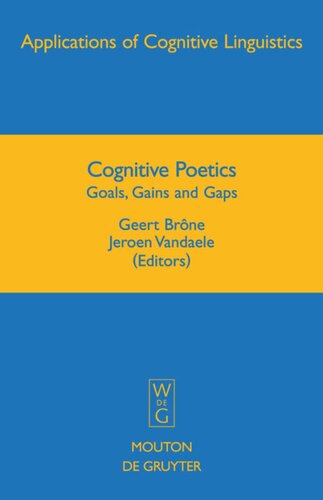

Most ebook files are in PDF format, so you can easily read them using various software such as Foxit Reader or directly on the Google Chrome browser.
Some ebook files are released by publishers in other formats such as .awz, .mobi, .epub, .fb2, etc. You may need to install specific software to read these formats on mobile/PC, such as Calibre.
Please read the tutorial at this link: https://ebookbell.com/faq
We offer FREE conversion to the popular formats you request; however, this may take some time. Therefore, right after payment, please email us, and we will try to provide the service as quickly as possible.
For some exceptional file formats or broken links (if any), please refrain from opening any disputes. Instead, email us first, and we will try to assist within a maximum of 6 hours.
EbookBell Team

4.8
54 reviewsFor more than two decades now, cognitive science has been making overtures to literature and literary studies. Only recently, however, cognitive linguistics and poetics seem to be moving towards a more serious and reciprocal type of interdisciplinarity. In coupling cognitive linguistics and poetics, cognitive poeticians aim to offer cognitive readings of literary texts and formulate specific hypotheses concerning the relationship between aesthetic meaning effects and patterns in the cognitive construal and processing of literary texts. One of the basic assumptions of the endeavour is that some of the key topics in poetics (such as the construction of text worlds, characterization, narrative perspective, distancing discourse, etc.) may be fruitfully approached by applying cognitive linguistic concepts and insights (such as embodied cognition, metaphor, mental spaces, iconicity, construction grammar, figure/ground alignment, etc.), in an attempt to support, enrich or adjust ‘traditional’ poetic analysis. Conversely, the tradition of poetics may support, frame or call into question insights form cognitive linguistics.
In order to capture the goals, gains and gaps of this rapidly growing interdisciplinary field of research, this volume brings together some of the key players and critics of cognitive poetics. The eleven chapters are grouped into four major sections, each dealing with central concerns of the field: (i) the cognitive mechanisms, discursive means and mental products related to narrativity (Semino, Herman, Culpeper); (ii) the different incarnations of the concept of figure in cognitive poetics (Freeman, Steen, Tsur); (iii) the procedures that are meant to express or create discursive attitudes, like humour, irony or distance in general (Antonopoulou and Nikiforidou, Dancygier and Vandelanotte, Giora et al.); and (iv) a critical assessment of the current state of affairs in cognitive poetics, and more specifically the incorporation of insights from cognitive linguistics as only one of the contributing fields in the interdisciplinary conglomerate of cognitive science (Louwerse and Van Peer, Sternberg). The ensuing dialogue between cognitive and literary partners, as well as between advocates and opponents, is promoted through the use of short response articles included after ten chapters of the volume.
Geert Brône, Katholieke Universiteit Leuven, Belgium; Jeroen Vandaele, University of Oslo, Norway.